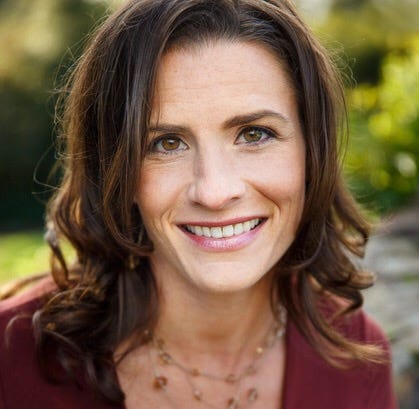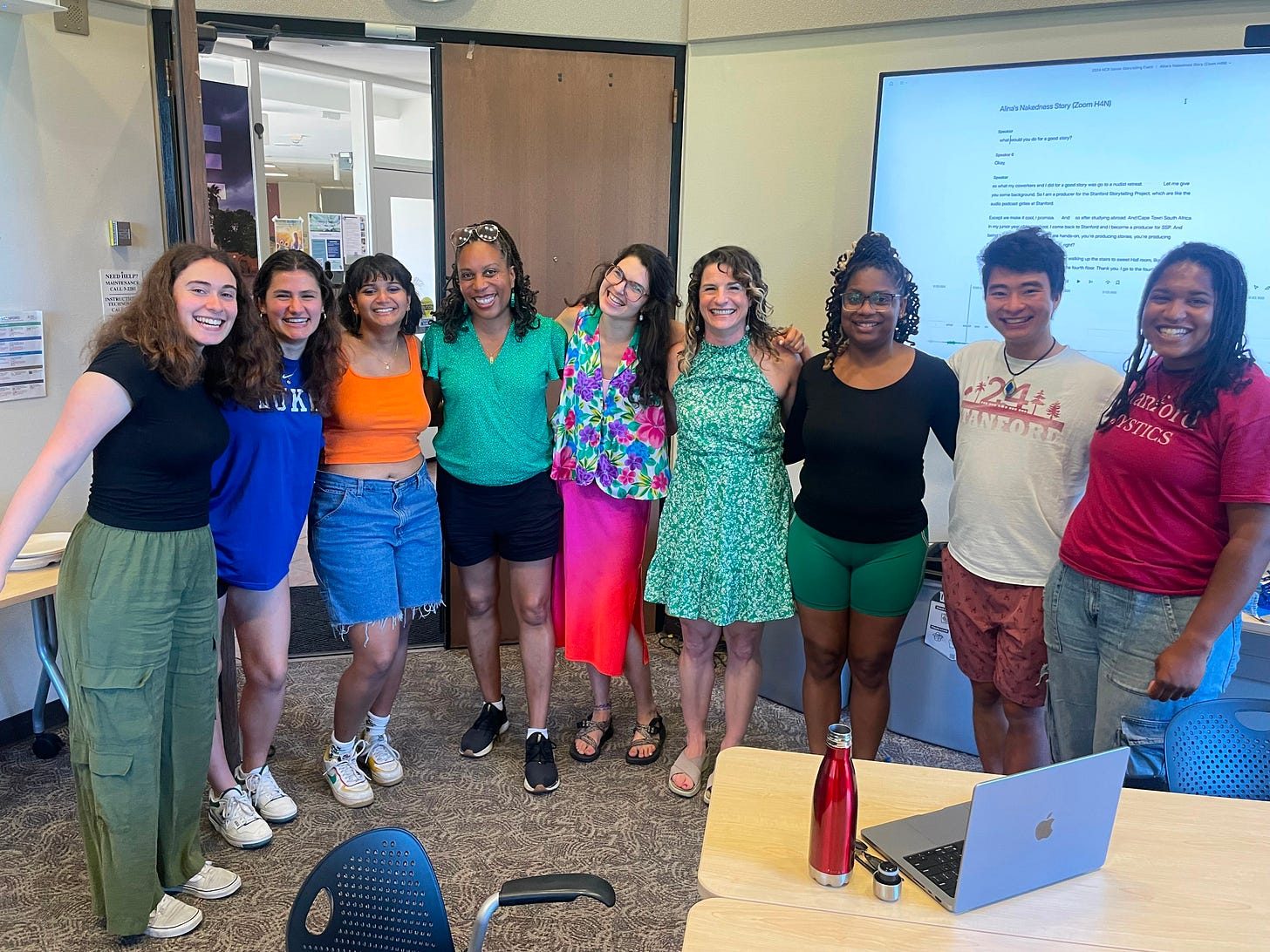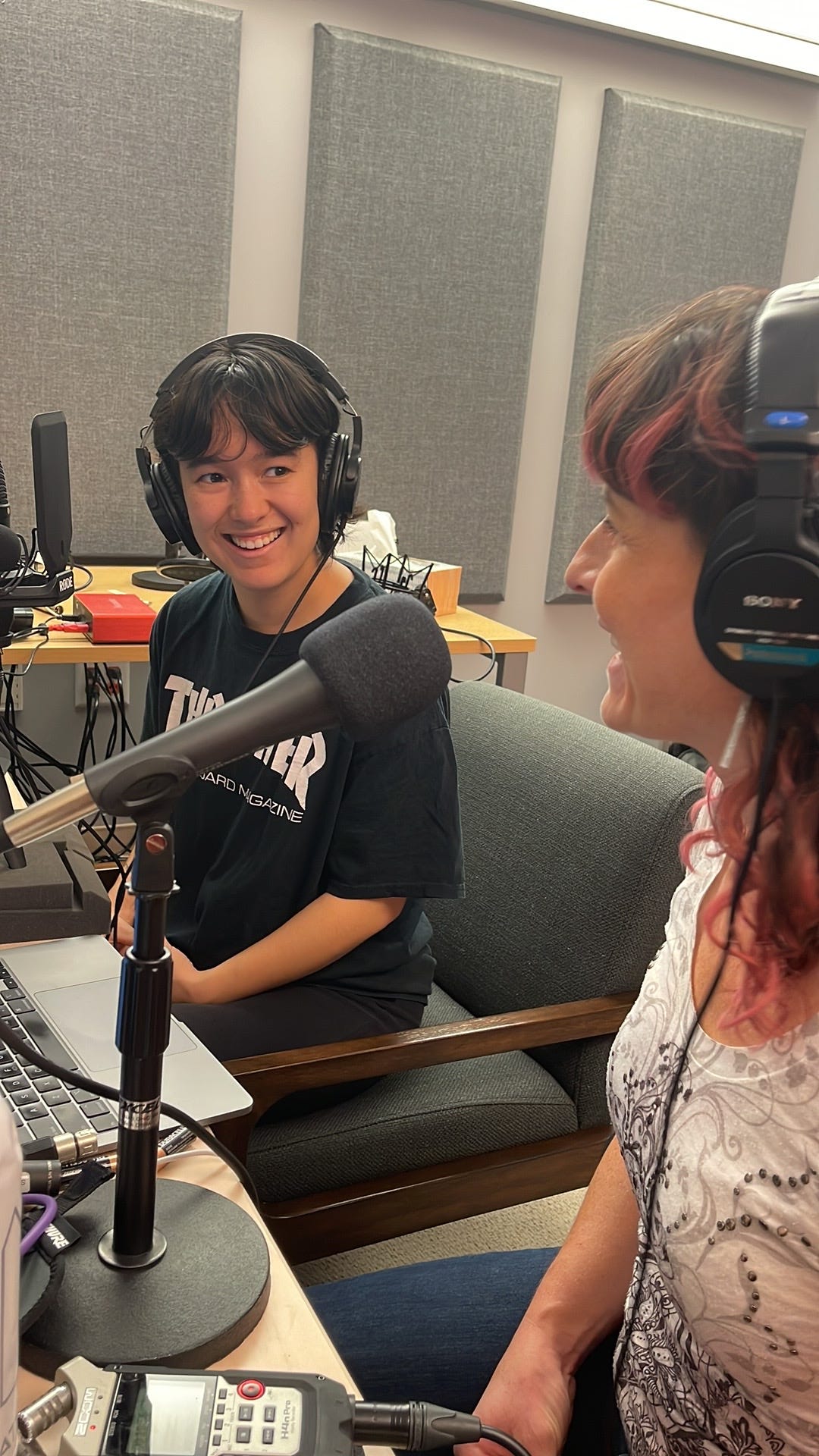Welcome to The Audio Storyteller: tips and tricks for audio producers. Subscribe to get the full list of jobs and training straight to your inbox 💌
Hey audio storytellers!
It’s been a minute. I’m back in your inboxes after a longer-than-planned hiatus. It’s been a tumultuous and difficult start to the year here in Los Angeles, and across the US. I hope you’ve been safe wherever you are. In all honesty, it’s not been the easiest time to summon enthusiasm for the audio industry; I’ve been in head-down hibernation mode. But this week I’m seeing the first signs of spring… and feeling a little optimism along with it.
Which is why this hopeful conversation with the wonderful Laura Joyce Davis is coming at just the right time. Laura is a lecturer at Stanford and managing editor of the university’s Storytelling Project, an arts program that explores the transformative nature of stories. She’s also an award-winning writer, producer and the cofounder of workshop series Narrative Podcasts. Above all, Laura is a teacher – and in this issue we talk about the importance of revising drafts, tackling perfectionism, and routes into teaching audio.
👉 Make sure you read to the end for a bumper issue of jobs, events, pitch call-outs and training opportunities. 👈
How did you get into teaching?
I’m laughing because if you’d have asked me five years ago if I would have been doing any of this, I would have been like: of course not! But then again, I was a coach for many years. In my 20s and 30s I was a collegiate coach and before that, a high school coach. So looking back, it’s like I was always a teacher. Coaching is essentially teaching and mentoring.
It was really the pandemic that launched me into this crazy journey. I’d been a writer for 20 years, but back in March 2020, I knew nothing about podcasting or editing audio. I barely knew how to use my microphone. I launched the Shelter in Place podcast, thinking I’d be making it for two weeks – and that turned into 200 episodes.
About 100 episodes in, I started hearing from people, like a grad school classmate of mine who asked if I could train his colleague in podcasting. From there it very quickly mushroomed. My husband Nate and I developed a curriculum, which is now an online series of workshops [Narrative Podcasts].
That really is what led to summer of 2022 when I saw the Stanford job posting. I wasn’t even looking for a job. I thought we’d keep doing Narrative Podcasts courses – but as a startup it was really hard to make it full time and pay yourself. And in full transparency: I was tired at that point. I was really loving the work, but I was working way too many hours and not getting paid. The idea of a full-time job with a paycheck and benefits sounded really good.
The Stanford job caught my eye because it was like they’d written the job description for me. It was uncanny. It was teaching, mentorship and podcasting production: my dream job.
I’m coming to the end of my third year there, and it feels so sweet to be in a place that is just so perfectly aligned with who I am. I feel like the DNA of this program is the same way I approach storytelling and podcasting. It’s special.
Every job has its challenges, of course, but I continually give my boss, Jonah Willihnganz, so much credit for creating this program. I don't know of any other programs out there that are exactly like this. The main goal, even more than making beautiful stories, is student transformation through the power of the creative process and witnessing other people’s stories. That’s why I do this – for myself, and for my students. I just love what can happen to us when we tell great stories: it really does change us.
You said the Stanford Storytelling Project’s approach to storytelling is the same as your own. Tell me more about that.
I was a fiction writer for many, many years before this. I can remember working on novels and doing like draft 15, draft 16. I would think I was done, but an agent would give feedback and I would rewrite the whole thing. I remember thinking, this is ridiculous. It was really frustrating.
Looking back, I can see now that the revision process actually is the magic of storytelling. Because it forces us to really confront our mistakes, look at our work and be willing to make it better by cutting and rearranging.
That process, I think, is such a wonderful metaphor for life. I personally still struggle with perfectionism – I’ve gotten a lot better – but I think that storytelling and podcasting in particular has taught me that not only is revision okay, but that’s actually the goal.
If I can allow myself to make mistakes and forgive myself if I don't get it right the first or second time, then I'm actually going to get better at this. But if I come at it with a perfectionist mindset, where I have to get it right immediately, then I’m going to be stressed out or mad.
I think I saw that in myself most acutely when I was making episodes of Shelter in Place. I could watch and hear myself getting better. And there are some episodes that I don't love as much, but I haven't taken them down because it’s really important for my students to see this process. There was nothing particularly special about me, I just did the work and the revision, like any creative person who really cares about their work and wants to make it better.
By doing that, I found that I was a lot kinder to myself, and I actually had more fun. I became more playful and sort of whimsical about the whole creative process.
And at Stanford, I really have the sense that these people are kindred spirits. They think about the creative process in a very similar way.
Do you think there's something about audio production that lends itself better to that frame of mind as compared to writing?
I do. When you're writing, it's usually a very solitary process. Even once you put stuff out there, sometimes you don't really hear people's response to it.
Whereas with podcasting, you have ears listening, and not just once it's out there, but all through the process. There's this thing where it's almost like you're able to step outside of the work for a minute and hear it the way a listener would. It’s a skill we all develop as producers: the ability to step back and be like, okay, let's get out of the weeds. How would a listener hear this right now?
Audio also tends to be faster than print writing. There's something sort of freeing and almost playful about moving [faster in audio] and realizing that you can still do good work without being so meticulous about every little thing.
What are some challenges your Stanford students come up against repeatedly?
The revision process is the number one thing I get resistance about. Mostly because my students are not people who are coming from creative backgrounds – they’re in STEM, which is a really fun challenge to teach somebody who has never really thought about storytelling before, because that’s just not in their world.
So I've learned to really be clear from the beginning that this is going to be a lot of work. Podcasting is not just press record, chat with your friend and then press stop. Some quarters – like right now – I have the most magical class. They’re all in, they love what they’re doing and it’s so evident. And then I’ve had classes that were the total opposite. I’ve learned that you can't always predict how it's going to be. You can teach the same thing and have totally different results based on the group of students.
Especially for a group of students who have gotten into a place like Stanford because they've been the smartest person in the room in most places of their life. And the way that they've done that is to do something one time really well and knock it out of the park.
So the ones that embrace [the revision process] do really well – they have so much fun. And the ones that resist it, it’s a little painful for them!
[Another thing] I teach over and over again is writing for the ear. We really look at the difference between writing this story as an essay (which they also do as part of the class), and then writing that same story for audio. We look at some examples of stories that exist in both forms, and then they try to do that for themselves.
Your Stanford bio says you “help students turn climate change research into planet-saving stories”.
When I got this job, I was allowed to create a class that was brand new for Stanford. I created a class called Stories to Save our Planet. The students come in with an idea and then working in small groups, they create a narrative podcast episode about a climate change solution, and crucially the story behind it.
In the first year I taught the class, some of my students did a story about regenerative agriculture. They heard this amazing story of a guy in the Chihuahuan Desert, in Mexico, who turned land into lush green pasture by doing nothing beyond moving his cattle herd to a different area every single day for a year. He used movable fences. The land created its own ecosystem, didn’t require irrigation, and now holds more water than everywhere else around it.
This inspired the students to go find people in the Bay Area who were doing the same thing. They did a couple of great interviews, including with one person who used to work for big agriculture, and is now a pioneer in [regenerative agriculture].
We try to have the students tap into the resources that are right here, and go out into the field to record.
You said the program’s main goal is student transformation through storytelling: can you give me an example?
One that comes to mind is our student Max Du. He was one of the first students I met at Stanford, and at that point he was pretty new to storytelling. He studies AI and robotics – that was always going to be his path. He loved podcasts though, and he’d been working on a story already. Through his involvement with the Storytelling Project, Max finished the story. It’s called Orca Boy, it ended up airing on the project’s State of the Human podcast.
[Here’s the synopsis of Orca Boy: Max Du was so obsessed with SeaWorld that his childhood friends called him Orca Boy. But when a SeaWorld trainer named Dawn was killed by an orca, his love for whales turned to shame . . . until he met Dawn’s best friend, a whale trainer named Lyndsey, who led him back to SeaWorld on a journey of reclaiming the Orca Boy that he’d thought was gone.]
He was working on that story for so long, it was such a passion for him. So when he was applying for jobs and PhD programs, that was often the thing that would come up in interviews. It would come up in all sorts of situations with his robotics work, where he would share: here's a situation in my life where I faced this challenge.
So last summer, Max ended up getting a job with the US Navy working with robotics and orcas and dolphins. Because of those conversations, they were like, we think this would be a good fit for you. And now he’s back at Stanford getting his PhD, and this has become a part of the work he does: [exploring] AI and how we can learn from these animals.
It’s been amazing to watch the way he changed. There’s so much nuance and maturity to the way he’s thinking about these things, because he spent a ton of time researching, talking to people and really getting his head around the whole issue [as part of producing the story].
I'm so proud. It's a sweet thing to get to witness, and help somebody through the process.
What are some of the things that you love about teaching?
I love that moment where you see the light bulb turn on for people when they finally understand what the story is really about. We all go in with topics, but often we don’t know what the real story is in the beginning. We have to do some work first, and there’s something that happens in the process where suddenly it all clicks into place. You’re like, oh I can see it now, I can see the scenes, I can see how this all fits together. And you get the ending that feels so satisfying, because you really earned it. It's so rewarding to get to see my students' faces light up.
A lot of times, it's very collaborative. We're laughing and having a great time. We're jumping in and finishing each other's sentences, because there's such excitement in the room over that idea coming together.
In the best teaching situations, it really is just helping people to understand what was always there, but they just had to uncover it or develop a new skill. [It’s allowing them to see] that even if they’ve never done this before, there’s something special that they bring to the table as a creator. I love helping people realize the beautiful things that are already inside them that can be drawn out through this work.
What’s your advice to audio producers who might be interested in teaching?
It depends on where you are in your career. If you're brand new and you're just trying to learn this stuff, then there may be some benefit in shadowing a teacher for a couple of weeks and watching their classes. Reach out to New York Public Radio, Ladio, Baydio – any of these great listservs – to start making those relationships. For people trying to get their toe in, there are some great places to start making connections, like the Salt Institute, NYU and Columbia.
Having a proof of concept, to show you have some teaching out in the world, is a good starting place – even if it’s just a few tutorials. You can then point to, for example, a three-part series teaching people how to tell stories.
You could also look beyond academia, because I think those academic jobs can be really hard to get. There are a lot of companies out there that are really hungry for storytelling training. [Laura recently taught a couple of classes for staff at Google, one on podcasting, and another on using storytelling in real-life pitch situations]. Google is an obvious example, but I can’t tell you the number of conversations I've had lately with people in all industries, who want to know how to tell a story to present to their clients.
We as storytellers can provide something that people really want, and it’s valuable.
The email version of this Substack is full of jobs, events, courses and other resources. Hit subscribe to get it all delivered straight to your inbox every month 🎤✨🎧
Thanks for reading audio storytellers! Appreciate your support by buying me a coffee or forwarding this newsletter to a friend.






